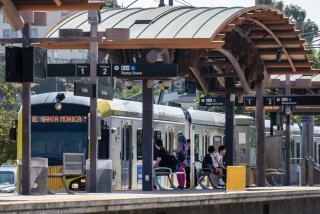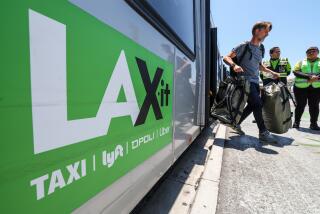Companies Face Deadline for Ride-Share Plan
- Share via
With his company operating 200 vans to get people to and from Los Angeles-area airports, the last thing SuperShuttle President John Goss expected to be accused of was failing to promote ride-sharing.
It wasn’t until an Air Quality Management District inspector showed up at SuperShuttle’s Imperial Highway headquarters last year with a $60,000 citation that Goss knew he had a problem.
To Goss’ surprise, the company, like several others in the South Bay, had failed to respond to a warning to file a mandatory report outlining a plan to get workers out of their cars and into car pools, van pools or mass transit.
After June 30, other companies may be getting a similar jolt.
Over the last three years, AQMD officials have been issuing formal warning notices to companies with more than 100 employees, telling them that they must turn in a commuter plan within 90 days.
Although the district knows from state records that there are 8,900 firms of that size within its four-county boundary, district officials have been able to get names and addresses to issue formal notices to only about 7,000 companies.
The AQMD is continuing its efforts to locate the remaining companies, all of which may be penalized if they do not come forward with a plan before June 30.
“We don’t have a perfect database . . . but we have heavily publicized this, so every affected company should know about it,” AQMD spokesman Bill Kelly said. “After a while, it’s unfair to those who have gone about getting their plans in and getting their programs in place to let the others continue without them. We had to set a final date.”
As part of the commuter plan, companies survey how their employees get to work and outline a system of incentives and education programs to get employees out of their cars. Each year, companies repeat the employee survey and submit a new report about the program’s effectiveness and describe planned improvements.
AQMD inspectors can stop by at any time to audit whether a company is doing what it has set out to do, Kelly said.
When the air quality district began gathering statistics early last year, it discovered that cars traveling during the peak rush period from 6 a.m. to 10 a.m. contained an average of 1.13 people, an indicator that too many commuters were driving alone.
By pressuring larger companies to promote alternative ways to get to work, the district hopes to nudge that number up to 1.5 people per car within the next two to three years.
“We know it takes time, and the goal is to make sure the companies are moving in the right direction, not to just penalize them for failing to get there fast enough,” AQMD spokeswoman Claudia Keith said.
After his expensive lesson in AQMD regulations, SuperShuttle’s Goss says he has taken the goal to heart.
The company’s failure to file within the 90-day limit, he said, was caused by an employee quitting without completing the initial commuter plan. SuperShuttle, which since has filed two of the annual reports, has agreed to settle the AQMD citation by spending $75,000 to convert its fleet to propane fuel.
“Once I understood what was expected of me, I had no problem doing it,” Goss said. “I’m glad to do it now. It’s good for our image, it’s good for the environment and our employees really seem to like it.”
SuperShuttle’s 600 workers now get attractive bonuses for hitching a ride with someone else, including cash payments, free gasoline and free passes to Disneyland and Magic Mountain. Next month, the company plans to start buying new bicycles for employees who live near enough to pedal to work.
If car-pool riders must leave work early or late, missing the trip home, SuperShuttle will pick up the tab to get them there in one of the company’s regular airport service vans.
A recent survey shows the company, which spends about $3,300 each month on its ride-share program, has achieved the district’s 1.5-person-per-car goal, said Ken Selden, who coordinates the ride-share program.
Workers at the company who car pool say they enjoy sharing their rides.
“Every time some idiot cuts in front of me and he’s alone, I yell at him, ‘Hey, you’re wasting gas,’ ” said systems manager Charlie Gregerson, who commutes from Culver City with payroll clerk Jerminia Lingad.
“We’re cutting down the traffic congestion and the smog,” Gregerson said. “You wouldn’t believe all the single heads we see when we’re sitting there in traffic.”
Adriana David, one of the company’s personnel assistants, said she wishes more people would car pool or ride the bus.
“It puts less cars on the roads, and I think there’s less accidents,” said David, who car pools with her sister, Michele Montez, a SuperShuttle cashier. Car-poolers “take more precautions not to drive so fast because other people are in the car,” she said.
At Little Company of Mary Hospital, workers who find alternative transportation to work can enter a monthly drawing for prizes ranging from a check for $100 to a weekend trip to San Francisco.
Parking attendants at the hospital stamp validation cards for workers who arrive in a car with someone else, on foot or on a bicycle. The more stamps workers acquire, the more chances they have to win.
Employees also are paid 50 cents for each day they participate in the program.
“There are some people who ride-share every single day, one way or another, because of the program,” said secretary Georgia Conrad, who catches a ride from her Redondo Beach home with a co-worker who drives from Westchester. “I think it’s great. . . . I won a TV last year.”
Hughes Aircraft responded to the AQMD regulation by expanding its popular van-pool program, spokesman Richard Dore said. Riders have been paying a set monthly fee for a seat in the van, which was to have covered all operational costs, while Hughes picked up the tab for the program’s administration.
The program’s expansion, however, reduced the average number of riders per van, Dore said, forcing Hughes to subsidize each van’s operation to such a point that the company is no longer able to support the program.
Starting July 1, Hughes employees will have to pick up the slack, which represents a cost increase for some of nearly 40%. Over the next 18 months, Hughes plans to phase out its van-pool system and encourage workers to hire on with a private van-pool firm.
Angry employees, stung by the sharp increase in van-pool charges, have said they may start driving to work alone again.
“We do expect as many as 30% of the riders to drop out of the van-pool program, but we believe those same people may take up car-pooling, which makes economic sense,” Dore said.
The company is continuing to push ride-sharing to its 50,000 employees by offering a $25 bonus to workers who talk colleagues into car-pooling, a $75 bonus after each car-pooler’s first three months of participation, and monthly $100 raffles for those who share a ride or take mass transit at least three days each week.
Hughes also makes sure there are rides home for employees who have to work late or leave early for an emergency.
Hughes, which spends about $1.5 million each year on the commuter program, also is sponsoring get-acquainted ride-share lunches for groups of employees who live in the same neighborhoods.
“As people look at each other, maybe they can start seeing that these are not unknowns and maybe they can commit to at least giving it a try,” said Renzo Venturo, corporate director for commuter transportation.
More to Read
Inside the business of entertainment
The Wide Shot brings you news, analysis and insights on everything from streaming wars to production — and what it all means for the future.
You may occasionally receive promotional content from the Los Angeles Times.










